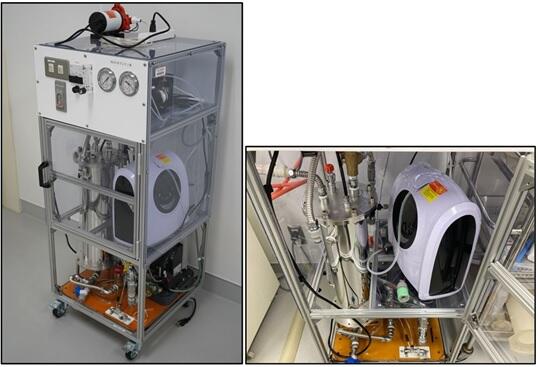A research group made up of Fumio Takizawa (graduate student), Associate Professor Hisanori Domon, Professor Yutaka Terao and graduate student Kana Shimizu of the Department of Microbial Infectious Diseases at the Graduate School of Medical and Dental Sciences, Niigata University confirmed that ozone ultrafine bubble water, a disinfectant solution generated by suspending nanoscale bubbles in water, is effective against bacteria. A prototype device was built in collaboration with Associate Professor Akiomi Ushida at the Faculty of Engineering of Niigata University and Futech Niigata. They will further improve the prototype production device.
Ozone can be produced using only water and air, is safe, and unlikely to cause allergic reactions because it is converted to oxygen over time. Once the device is installed, it can be produced in large quantities over a long period of time. The device is expected to be put into practical use. The research results were published in the April 12, 2023 issue of the international academic journal PLOS ONE.

Provided by Niigata University
The outbreak of COVID‐19 has increased the demand for disinfectant solutions and raised concerns about supply shortages and environmental pollution from effluents. In response, the research group considered using ozone, which is composed of oxygen atoms, as an alternative to chemicals such as ethanol. Normally, ozone is unable to remain in water for a long period of time, meaning that maintaining its disinfectant effect is difficult.
Therefore, the group investigated whether ozone gas could be formed into 100 nm nanobubbles and maintained in water. The results confirmed that 1 ppm ozone, which is effective against bacteria, can be maintained at 4 ℃ for approximately 24 hours and at 25 ℃ for approximately 6 hours. Various bacteria, such as indigenous bacteria, Pseudomonas aeruginosa, were significantly reduced after exposure to 1 ppm ozone.
Terao said, "The prototype device is still quite large. Because of this we are considering condensing it so that it can be installed in a kitchen, or other similar locations, and replacing the internal parts with metal because ozone accelerates the deterioration of the resin. We assume that the product can be used for one entire day if it is prepared in the morning and stored in the refrigerator. In addition, we would like to confirm the effects of the generated ozone on various viruses, such as the novel coronavirus."
Journal Information
Publication: PLOS ONE
Title: Ozone ultrafine bubble water exhibits bactericidal activity against pathogenic bacteria in the oral cavity and upper airway and disinfects contaminated healthcare equipment
DOI: 10.1371/journal.pone.0284115
This article has been translated by JST with permission from The Science News Ltd. (https://sci-news.co.jp/). Unauthorized reproduction of the article and photographs is prohibited.




